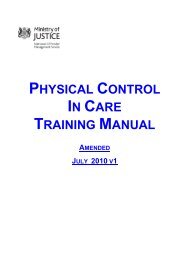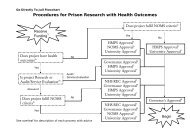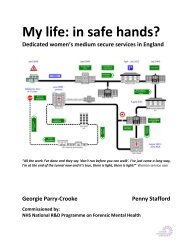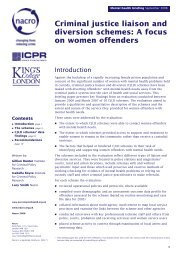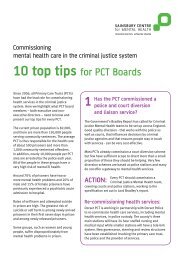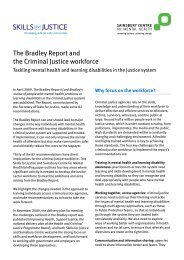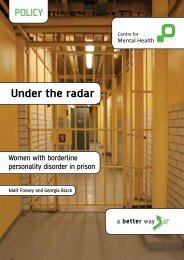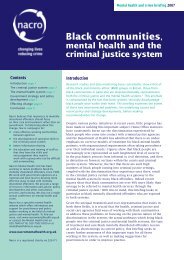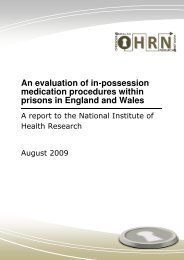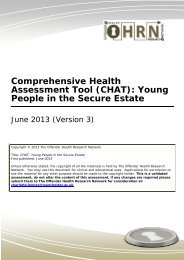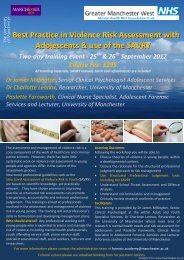Engendering Justice - from Policy to Practice - The Fawcett Society
Engendering Justice - from Policy to Practice - The Fawcett Society
Engendering Justice - from Policy to Practice - The Fawcett Society
- No tags were found...
You also want an ePaper? Increase the reach of your titles
YUMPU automatically turns print PDFs into web optimized ePapers that Google loves.
Chapter Four:Women Need <strong>Justice</strong> - Women as Victims of Crimefor vulnerable victims. Facilities are being put in<strong>to</strong> place<strong>to</strong> allow for these measures. For example, video links arenow available in 75 percent of Magistrates’ Courts and allCrown Court centres. Witness Liaison officers have alsobeen introduced in all courts. 166 However, because specialmeasures are not au<strong>to</strong>matic and have <strong>to</strong> be applied for,vulnerable witnesses often do not receive special measures.Victim Support <strong>to</strong>ld the Commission that problemsoccur for two main reasons – vulnerable and intimidatedwitnesses are not identified (initially by the Police or laterby the Witness Care Unit) and measures are not appliedfor on time resulting in the application not being granted ornot being available at the relevant court. Cases were alsonoted of CPS prosecu<strong>to</strong>rs and barristers trying <strong>to</strong> dissuadevictims and witnesses <strong>from</strong> utilising special measures onthe basis that they decrease the power of testimony. Nothaving access <strong>to</strong> these measures or not knowing whethermeasures will be in place can result in additional anxiety anduncertainty for victims – the very impacts that the specialmeasures were introduced <strong>to</strong> lessen. 167 <strong>The</strong> CPS needs <strong>to</strong>work <strong>to</strong> develop an approach <strong>to</strong> special measures which ismore consistent and reliable.I went <strong>to</strong> look around the court but was not given muchinformation. I asked <strong>to</strong> have screens put up and phonedthree times <strong>to</strong> check that this would be done…when thecourt date came the paperwork was missing so I had <strong>to</strong>give evidence without any screens. 168Rape Victim, Questionnaire Response, January 2009<strong>The</strong> Commission was also <strong>to</strong>ld that in cases of domesticviolence, special measures, such as the use of screens, areoften denied by Judges on the basis that the parties alreadyknow each other. As Victim Support <strong>to</strong>ld the Commission“This misses the point. In domestic violence situationsso much as a look <strong>from</strong> the perpetra<strong>to</strong>r can devastatethe victim and make it extremely difficult for them <strong>to</strong> giveevidence.” 169 It demonstrates a failure of some judges <strong>to</strong>understand the dynamics of power and control.Good <strong>Practice</strong> Example: Use of Special MeasuresA woman who was a witness in a court case stronglywanted <strong>to</strong> see the man who had abused her beingsentenced, but was very afraid. Her SOIT asked the Court<strong>to</strong> allow her <strong>to</strong> use a blocked off video link room so thatshe could observe the sentencing, but the perpetra<strong>to</strong>rcould not see her. She felt that this gave her a strongsense of closure.Eaves, Questionnaire Response, February 2009Many female magistrates noted that delays and long waitingtimes for cases <strong>to</strong> be heard was a significant issue forwomen, particularly those with childcare obligations. Manysingle parents or parents without support <strong>from</strong> family andfriends have <strong>to</strong> bring their children <strong>to</strong> court. This createsadditional pressure on the parent worrying about theirchildren as well as the experience of giving evidence. Whilewitness accommodation has improved, with 90 percent ofMagistrates’ Courts and Crown Courts now having somekind of separate waiting area for victims and witnesses, thewaiting time in the same building as the perpetra<strong>to</strong>r canbe very distressing for victims. <strong>The</strong> situation is particularlydifficult where cases are double-booked or listed as ‘floatingtrials’ requiring staying in the court building all day until acourtroom is allocated.<strong>The</strong> Commission recommends that where victims haveindicated that they have childcare problems, these casesshould not be double-booked or listed as ‘floating trials’and every effort should be made <strong>to</strong> fix the court date sothat childcare arrangements can be made.Many of the victims who shared their experiences with theCommission did not understand the Court process. As onewoman <strong>to</strong>ld the Commission:Even though I work in a university and am used <strong>to</strong>formalities I felt out of my depth in court. I did notunderstand who was who. I was not put in a witnessroom which I now know exists. I was kept waiting <strong>from</strong>9-12 and then <strong>to</strong>ld the court was breaking for lunch.All this time I was waiting <strong>to</strong> speak <strong>to</strong> the CPS <strong>to</strong> say Iwanted <strong>to</strong> drop charges. 170Page 58



